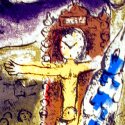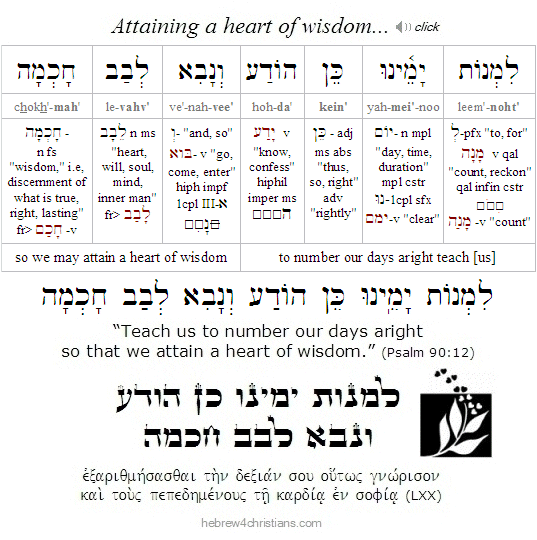|
In Torah portion Chayei Sarah we read about the death of Abraham, the original patriarch of the Jewish people and great hero of faith:"These are the days of the years of the life of Abraham (יְמֵי שְׁנֵי־חַיֵּי אַבְרָהָם), which he lived..." (Gen. 25:7). It is interesting to notice that this verse mentions Abraham's days (yamim: ימים) but then goes on to state the number of years (shanim: שנים) that he lived. Why, then, does the verse mention the word "days" at all? Moreover, the verse includes the seemingly redundant clause, "which he lived" (אֲשֶׁר־חָי), an addition that appears to be unnecessary to the meaning. Since the sages assumed that there were no unnecessary words revealed in the Torah, however, they discussed why the verse was written this way....
When we reckon a person's life span, we (objectively) refer to their physical longevity in terms of years. This is why we celebrate birthdays, after all, and that's why we refer to someone as being so many years old. Jewish tradition recognizes calendar years, of course (our verse states that Abraham lived 175 years), though the sages understood time primarily in terms of "length of days." When the patriarch Isaac died, for example, the Torah says he was "gathered to his people - זָקֵן וּשְׂבַע יָמִים - "old and full of days" (Gen. 35:29). The sages defined a day (yom: יְוֹם) in terms of the total time of daylight (measured from sunrise to sunset), and defined an hour (sha'ah: שָׁעָה) by dividing that time into 12 equal parts, called a "proportional hour" (sha'ah zemanit: שעה זמנית). Each proportionate hour was then divided into 1080 "parts" (chalakim: חלקים), and each part (chelek: חֵלֶק) was further divided into 76 "moments" (rega'im: רגעים). In other words, the sages measured time by increasingly smaller units (yechidut: יְחִידוּת), and these days, hours, "parts," and moments were used to objectively measure time (interestingly, modern science likewise "divide times" down to the smallest of units, measuring the length of time required for light to travel in a vacuum, i.e., "Planck time." In other words, space and time are known through observing light).
Life is surely more than a quantitative measurement of time, however. What good is a physically long life without a relationship with God? Is it not "vanity of vanities," a "tale told by an idiot, full of sound and fury, signifying nothing," as Shakespeare once said? Time finds its qualitative meaning, its purpose, and its direction only in relationship with God, who is the "beginning, the middle, and the end." Our personal histories likewise have a beginning, middle, and an end that together form a "story" about who we are.... Your life is "going somewhere," and each moment of your day is your means to that end. Each moment leads inexorably to the next, and together these moments form hours, days, and the "days of the years." Teshuvah (repentance) is a conscious choice to turn to God amidst the flux of passing time in order to awaken to the realm of the eternal. Therefore we see the greatest of the tzaddikim (such as Abraham) living out the "days of the years" in conscious awareness of eternity, and of his ultimate destination: "By faith Abraham obeyed when he was called to go out to a place that he was to receive as an inheritance. And he went out, not knowing where he was going. By faith he went to live in the land of promise, as in a foreign land, living in tents with Isaac and Jacob, heirs with him of the same promise. For he was looking forward to the city that has foundations, whose designer and builder is God" (Heb. 11:8-10). Faith affirms that underlying the "surface appearance" of fleeting time (z'man cholef: זמן חולף) is a deeper reality that is ultimately real and abiding (z'man nitzchi: זְמַן נִצְחִי). It "sees what is invisible" (2 Cor. 4:18) and understands (i.e., accepts) that the "present form of this world is passing away," like so many seconds ticked off a clock (1 Cor. 7:31). Time in this world (olam hazeh: עולם הזה) is linear, with a beginning and end in the world to come (olam ha'ba: עולם הבא).
Time is God's gift to us, as well as a test... The story is told about how a man once spied the Vilna Gaon sitting at a table in the evening, weeping over a small piece of paper he had pulled from his pocket. After he wiped away the tears, the Gaon got up and left the room, leaving the paper on the table. The man who oversaw this then went over to look at the piece of paper and saw just seven dots marked on it, nothing else. Overcome by curiosity, the following morning the man asked the Gaon what the paper meant and why it made him cry. The Gaon then explained that each evening he would review how he used his time that day. For every moment he wasted, he would mark a dot on a piece of paper. At the end of the day he would look at the paper and ask God's forgiveness for wasting the time.
The point of the story is that time is a precious gift, and how we choose to live each moment makes an eternal difference in our lives. As Moses prayed to God: "Teach us to number our days aright, so that we attain a heart of wisdom" (Psalm 90:12). We obtain such wisdom (chochmah: חָכמָה) through the study of Torah (talmud torah: תלמוד תורה): "And you shall meditate upon (the Torah) day and night" (Josh. 1:8). As disciples (talmidim: תַּלְמִידִים), we must study the Scriptures to show ourselves approved before God (2 Tim. 2:15). But study alone is not enough. We must practice the truth and walk it out in our daily lives: "Only take care, and keep your soul diligently (שְׁמֹר נַפְשְׁךָ מְאֹד)... Turn not away from your heart all the days of your life" (כֹּל יְמֵי חַיֶּיךָ, Deut. 4:9). Amen. "Above all else guard your heart, for from it are the outflows of life" (תּוֹצְאוֹת חַיִּים, Prov. 4:23).
למנות ימינו כן הודע
ונבא לבב חכמה
leem·noht · yah·mei'·noo · kein · hoh·da
ve·nah·vee · le·vahv · chokh·mah

"Teach us to number our days aright,
so that we attain a heart of wisdom" (Psalm 90:12)

As followers of Yeshua, we are commanded to "redeem" (ἐξαγοράζω) the time, because the days are evil (Eph. 5:16; Col. 4:5). The Greek word used here implies exchanging the fleeting moments of the day (z'man cholef: זמן חולף) with the eternal consciousness (z'man nitzchi: זְמַן נִצְחִי) that we will one day stand before the Judgment Seat of Messiah and give account for the "length of our days" (Matt. 12:36-37).
May the LORD help us wake up and refuse to exchange the eternal treasure (otzar nitzchi: אוֹצָר נִצְחִי) of the Kingdom of God for the fleeting vanities of this world (havalim cholefim: הֲבָלִים חוֹלְפִים). As the late Jim Eliot succinctly reminded us, "He is no fool who gives what he cannot keep to gain what he cannot lose." אמן, עזור לנו אלוהים - "Amen, help us O God."
|




